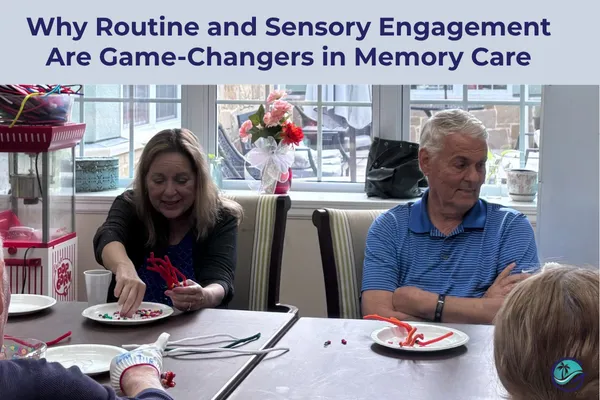
Why Routine and Sensory Engagement Are Game-Changers in Memory Care: A 2025 Guide for Families
Understanding the Power of Routine in Memory Care
The human brain, especially one affected by dementia, craves predictability. When memory deteriorates, the familiar becomes an anchor. A structured daily routine provides residents with a sense of control and security that can dramatically reduce anxiety, agitation, and behavioral challenges.
In 2025, leading memory care communities recognize that routine isn't about rigid scheduling—it's about creating a framework that allows residents to experience success and familiarity throughout their day. When a resident knows that breakfast happens at 8 AM, followed by a morning activity at 9:30 AM, and lunch at noon, their brain doesn't have to work as hard to process uncertainty. This cognitive relief translates into calmer, more engaged residents.
Research shows that residents who experience consistent routines have fewer episodes of sundowning (increased confusion and agitation in late afternoon), better sleep patterns, and improved appetite. For families, this means fewer crisis calls from the care community and the peace of mind that comes from knowing your loved one's day has structure and purpose.
The Sensory Component: Engaging More Than Just the Mind
Here's where memory care in 2025 is evolving beyond basic care: the integration of sensory therapy into daily routines.
As cognitive abilities decline, sensory experiences become increasingly important. Touch, smell, sound, sight, and taste can trigger memories, emotions, and engagement even when verbal communication becomes difficult. A resident in late-stage dementia may not remember their daughter's name, but they might light up at the smell of their favorite perfume or the texture of a familiar blanket.
Progressive memory care communities are now incorporating sensory activities into their daily routines:
Aromatherapy sessions using familiar scents (lavender for calm, citrus for energy)
Tactile activities like gardening, pet therapy, or working with textured materials
Music therapy tailored to each resident's era and preferences
Taste experiences featuring comfort foods from their past
Visual stimulation through art, nature, and color-coordinated environments
The magic happens when these sensory experiences are scheduled consistently. A resident who participates in a 9:30am 'Movin' & Groovin' session learns to anticipate it. Their brain begins to prepare for that experience, creating a positive feedback loop of engagement and emotional connection.
How Routine + Sensory Engagement Reduces Behavioral Challenges
One of the biggest concerns families have when placing a loved one in memory care is behavioral changes—aggression, wandering, resistance to care. Many of these behaviors aren't random; they're often a response to confusion, fear, or unmet sensory and emotional needs.
When a memory care community combines structured routine with sensory engagement, something remarkable happens: behavioral incidents decrease significantly.
Here's why: A resident who is confused and anxious (common in dementia) is more likely to act out. But a resident who experiences a predictable day filled with sensory engagement—activities that feel good, smell good, sound good—has fewer triggers for anxiety and agitation. They're not just passing time; they're experiencing moments of joy and connection.
For example, consider a resident with moderate dementia who typically becomes agitated during afternoon care routines. A community using routine + sensory engagement might:
Establish a consistent pre-care routine (same caregiver, same time, same preparation)
Incorporate sensory calming (soft music playing, familiar scent in the room, gentle touch)
Use positive reinforcement (favorite snack after care, praise, familiar activity to follow)
The result? The resident's resistance decreases, care becomes easier, and the resident experiences less distress.
The Family Benefit: What to Look For in a Memory Care Community
When evaluating memory care options for your loved one, ask these specific questions:
About Routine:
What does a typical day look like? (Ask for a written schedule)
Check out our blog: The Rhythm of Life: How Our Daily Schedule Brings Comfort, Connection, and Joy to Memory Care at Gulf Coast Memory Care
How consistent are mealtimes, activities, and care routines?
What happens if a resident resists the routine?
About Sensory Engagement:
What sensory activities are offered? (Ask for specific examples)
How are these activities personalized to individual residents?
Do staff members know residents' sensory preferences (favorite music, scents, textures)?
Is there a dedicated sensory or activity program?
Integration:
How are sensory activities incorporated into the daily routine?
Do staff members receive training on sensory engagement techniques?
Are families involved in identifying sensory preferences?
Real-World Impact: What Families Report
Families whose loved ones are in memory care communities that prioritize routine and sensory engagement consistently report:
Fewer behavioral incidents at home during visits
Better sleep and appetite
Increased engagement with staff and other residents
Reduced medication needs for anxiety or agitation
More positive phone calls from the facility
Better quality of life overall, even as cognitive decline continues
The Bottom Line: Routine and Sensory Engagement Aren't Luxuries
In 2025, quality memory care recognizes that routine and sensory engagement aren't nice-to-haves—they're essential components of dignified, compassionate care. They're the difference between a resident who is merely safe and a resident who is engaged, calm, and experiencing moments of joy.
As you navigate the memory care landscape, remember: the best communities don't just manage dementia; they create environments where residents can thrive within the reality of their condition. Routine provides the structure their brain needs, and sensory engagement provides the connection their spirit needs.
When you find a memory care community that truly understands and implements both, you've found a place where your loved one won't just be cared for—they'll be valued.